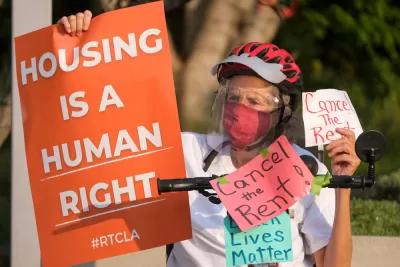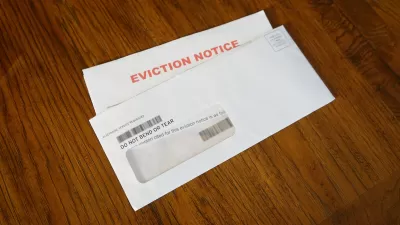What should we make of the administration’s tenants' rights announcement?

The Biden administration’s announcement on renters' rights on January 25 was a strange mix of radical and nothingburger.
On the one hand, outside of a few very important but narrowly focused laws like the Fair Housing Act, the federal government has, until now, not seen broad tenant protections as within its sphere of action at all. Anything to do with eviction policies, habitability and codes, or regulating rent increases has been left to states and localities. Someone asked me right after the announcement if I knew how long it had been since a president addressed tenant rights—they guessed the 1970s. Having recently edited a history of the National Tenants Union in the 1970s and ’80s, that era was fresh in my mind and I knew that despite active tenant organizing, federal action at the time was not pro-tenant, so I went back further and guessed the New Deal. But the New Deal was really focused on homeowners and creating public housing. I haven’t actually been able to find anything comparable in our history about renter rights and protections at all.
In that way, this is a really big deal. By taking it on at all, by making even a theoretical Blueprint for a Renters Bill of Rights, the Biden administration is acknowledging that this is something that the federal government has a legitimate interest in, power to act on, and responsibility to take seriously.
A year ago or so, we hosted a chat about security deposit policy in the U.K. Even more than the details of their policy, I remember that everyone in the office was mind-blown by the idea of a federal government that has a tenant policy. One where even Boris Johnson had to at least make a nod to wanting to support tenants somehow.
And so, the Biden announcement feels like it could be the beginning of a tremendous sea change. The administration has declared that the leases of today are a problem (we agree). It is engaging the Federal Trade Commission and the Consumer Financial Protection Bureau against the abuses of tenant screening companies, which could lead to real improvements in tenants’ lives if a crackdown occurs.
But most notable to me was the willingness to even state the phrase ...
[See full article, linked below, to continue reading.]
FULL STORY: Biden’s Renters Rights Blueprint: Meaningful or Not?

Alabama: Trump Terminates Settlements for Black Communities Harmed By Raw Sewage
Trump deemed the landmark civil rights agreement “illegal DEI and environmental justice policy.”

Study: Maui’s Plan to Convert Vacation Rentals to Long-Term Housing Could Cause Nearly $1 Billion Economic Loss
The plan would reduce visitor accommodation by 25% resulting in 1,900 jobs lost.

Planetizen Federal Action Tracker
A weekly monitor of how Trump’s orders and actions are impacting planners and planning in America.

Waymo Gets Permission to Map SF’s Market Street
If allowed to operate on the traffic-restricted street, Waymo’s autonomous taxis would have a leg up over ride-hailing competitors — and counter the city’s efforts to grow bike and pedestrian on the thoroughfare.

Parklet Symposium Highlights the Success of Shared Spaces
Parklets got a boost during the Covid-19 pandemic, when the concept was translated to outdoor dining programs that offered restaurants a lifeline during the shutdown.

Federal Homelessness Agency Places Entire Staff on Leave
The U.S. Interagency Council on Homelessness is the only federal agency dedicated to preventing and ending homelessness.
Urban Design for Planners 1: Software Tools
This six-course series explores essential urban design concepts using open source software and equips planners with the tools they need to participate fully in the urban design process.
Planning for Universal Design
Learn the tools for implementing Universal Design in planning regulations.
Caltrans
Smith Gee Studio
Institute for Housing and Urban Development Studies (IHS)
City of Grandview
Harvard GSD Executive Education
Toledo-Lucas County Plan Commissions
Salt Lake City
NYU Wagner Graduate School of Public Service





























